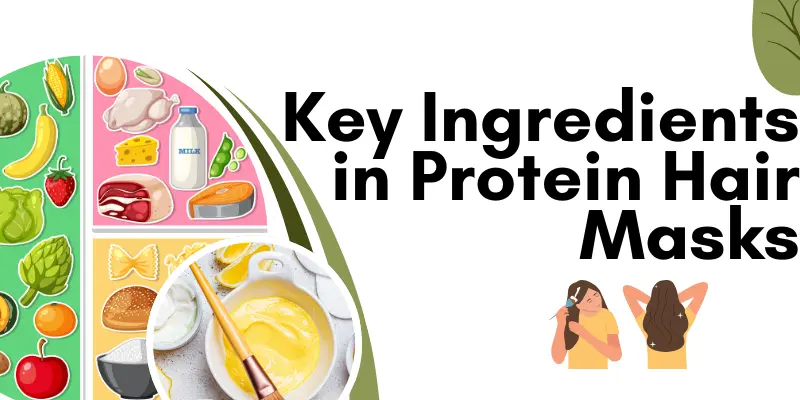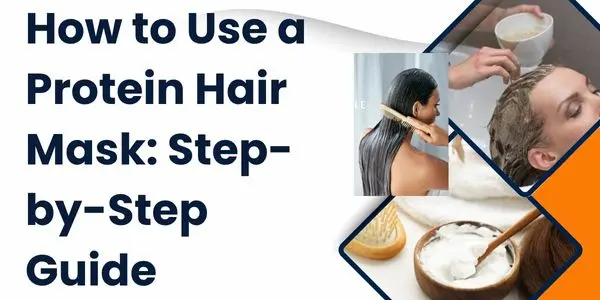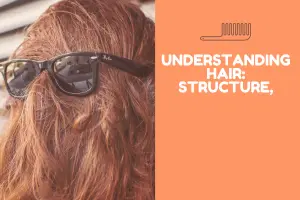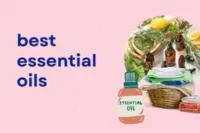The Ultimate Guide to Protein Hair Masks – Nourish and Strengthen Your Locks
Published: 26 Sep 2024
If you’re like me, you’ve probably spent countless hours searching for a solution to hair damage. My journey with protein hair masks began when my hair became brittle, dry, and lifeless due to constant heat styling and coloring. I tried dozens of products, but nothing seemed to restore the strength and shine my hair had lost-until I discovered the power of protein hair masks.
In this ultimate guide, I’ll walk you through everything you need to know about protein hair masks. Whether you’re dealing with dryness, breakage, or just need an extra boost of hydration, these masks are your secret weapon for stronger, shinier hair. From understanding how they work to the best ways to apply them, you’ll learn how to restore and nourish your hair with the right protein-packed products.
What Are Protein Hair Masks and Why Do You Need Them
Protein hair masks are a powerful tool in hair care routines, particularly for those dealing with damage caused by heat styling, chemical treatments, or environmental factors. These masks work by replenishing the proteins that your hair loses over time, restoring strength, elasticity, and shine. They penetrate deep into the hair shaft to rebuild damaged areas from the inside out.
Protein hair masks are formulated with ingredients like keratin, collagen, and silk proteins to give your hair the nourishment it needs to repair and strengthen itself. If you’re struggling with brittle or lifeless hair, these masks can be a game-changer.
Personal Experience: My Journey with Protein Hair Masks
When I first tried a protein hair mask, I didn’t expect much-after all, I had already used numerous hair care products that promised to restore my hair’s health, only to be left disappointed. However, after just a few weeks of using a protein hair mask regularly, I noticed significant changes. My hair became noticeably smoother, stronger, and more manageable. It was as if I had breathed new life into my hair!
From that point forward, protein hair masks became a staple in my hair care routine. Now, I’m here to share my expertise and help you achieve the same results. Whether your hair is curly, straight, thick, or fine, protein masks can work wonders.
How Protein Hair Masks Work: Restoring Strength and Health
Protein hair masks are designed to restore the internal structure of your hair, replenishing the lost proteins that keep your strands strong and healthy. Our hair is made of keratin, a protein that can be damaged by environmental factors, heat styling, and chemical treatments. Over time, these damages can weaken the hair, causing breakage and split ends.
Protein hair masks help by filling in the gaps in the protein structure of your hair, making it stronger and less prone to damage. These masks are a powerful solution that uses protein for hair repair, acting like a deep treatment kit for your strands. Instead of merely moisturizing the surface, protein masks penetrate the hair shaft and restore it from the inside out.
Key Ingredients in Protein Hair Masks
Protein masks are packed with key ingredients that are essential for rebuilding and strengthening hair. These ingredients work together to restore your hair’s natural shine, texture, and strength.

Keratin
Keratin strengthens and smooths the cuticle, making hair less prone to breakage. It helps repair weak or damaged strands, giving your hair a healthier appearance.
Collagen
Collagen improves elasticity and adds shine to dry, dull hair. It supports the hair’s structure, making it more resilient to damage.
Silk Protein
Silk protein helps seal in moisture while giving hair a shiny, glossy finish. It also prevents frizz, leaving your hair feeling smooth and silky.
Wheat Protein
Wheat protein deeply hydrates and repairs damaged hair, restoring its natural softness and elasticity. It strengthens hair from the inside, making it more resistant to environmental stressors.
Choosing the Right Protein Hair Mask for Your Hair Type
Not all protein masks are created equal. When selecting a protein mask, you should always consider your hair type and specific needs. Here’s how to choose the right mask:
For Fine Hair
If your hair is fine, look for a protein mask that adds volume and strengthens without weighing your hair down. Look for masks that contain lightweight proteins such as hydrolyzed silk protein, which will fortify your strands without making them feel heavy.
For Curly or Coily Hair
Curly and coily hair types tend to be more fragile and require more moisture and protein. Choose masks with ingredients like keratin or collagen that will provide structure while improving curl definition.
For Color-Treated Hair
Color-treated hair can become weak and prone to breakage, which is where protein masks come in. One of the best Color-Treated Hair care tips is to opt for a mask specifically formulated for dyed hair. Hydrolyzed wheat protein is an excellent choice for strengthening color-treated strands and helping to prevent fading.
My Personal Story: The Difference Protein Hair Masks Made for My Hair
I remember the first time I used a protein hair mask on my color-treated hair. I was skeptical, as I had tried so many products in the past without any real results. But after a week of using the mask, my hair felt incredibly smooth and had regained its natural shine. My split ends became less noticeable, and my hair felt thicker and healthier overall.
Since then, I’ve incorporated protein hair masks into my regular hair care routine. They’ve become an essential part of my hair transformation journey, especially during the colder months when hair tends to lose moisture. By using protein masks consistently, I’ve seen a noticeable reduction in breakage, and my hair feels more resilient.
How to Use a Protein Hair Mask: Step-by-Step Guide

To get the most out of your protein hair mask, follow these simple steps:
Step 1: Shampoo Your Hair
Start by shampooing your hair with a sulfate-free shampoo to remove any buildup. This will allow the mask to penetrate deeply into the hair shaft.
Step 2: Apply the Mask
Apply a generous amount of the protein mask to your damp hair, focusing on the mid-lengths and ends. Avoid the roots to prevent your hair from feeling greasy.
Step 3: Leave it on
Let the mask sit for 5-20 minutes, depending on the product instructions. The longer you leave the mask on, the deeper it can penetrate your hair.
Step 4: Rinse Thoroughly
After the recommended time, rinse the mask out with cool water. This helps seal the hair cuticle and lock in moisture.
Step 5: Style as Usual
Once your hair is rinsed, you can style it as usual. You’ll notice your hair feels smoother and more manageable.
The Benefits of Protein Hair Masks
Regular use of protein hair masks offers several long-term benefits:

- Stronger Hair: Protein repairs the internal structure of the hair, making it more resistant to breakage.
- Shinier Hair: Protein masks add gloss and smoothness to your hair, reducing frizz.
- Improved Elasticity: With regular use, your hair will become more elastic, making it less likely to snap.
- Healthier Texture: Protein masks help restore your hair’s natural texture, making it easier to style.
Common Mistakes to Avoid When Using Protein Hair Masks
While protein masks are incredibly effective, it’s easy to overuse them or apply them incorrectly. Here are a few common mistakes to avoid:
Using Too Much Product
A little goes a long way. Overuse can weigh your hair down and cause buildup.
Not Rinsing Properly
Leaving any mask residue in your hair can make it feel greasy and heavy.
Using Too Frequently
Overusing protein masks can cause your hair to become too stiff and brittle.
Conclusion: Restore Your Hair with Protein Masks
Incorporating protein hair masks into your routine is a game-changer. Whether your hair is damaged from styling, coloring, or environmental factors, a protein mask can help restore its strength, texture, and shine. I’ve seen incredible improvements in my hair’s health since adding protein masks to my regimen, and I’m confident you’ll experience the same benefits.
For anyone between the ages of 16-40, whether you have fine, curly, or color-treated hair, this article offers clear steps and advice that will transform your hair care routine. By regularly using protein masks, you’ll give your hair the care it deserves, making it stronger, shinier, and more resilient.
FAQs About Protein Hair Mask
A protein hair mask is a treatment designed to repair and strengthen hair that has been damaged by heat, coloring, or styling. It works by filling in gaps along the hair shaft where protein loss has occurred. This helps restore elasticity, reduce breakage, and make hair look healthier. With regular use, hair becomes stronger, shinier, and less prone to split ends.
Signs of protein deficiency in hair include excessive breakage, shedding, and a weak, stretchy texture. If your hair feels soft but lacks strength, or if it snaps easily when brushed, it likely needs protein. Dullness, limpness, and difficulty holding styles are also common signs. A protein mask can restore balance and give hair its resilience back.
Most people benefit from using a protein mask every 2–4 weeks. If your hair is severely damaged from bleaching or heat styling, you may need it more frequently at first. For healthier hair, once a month is usually enough to maintain strength. Overusing it can cause protein buildup, so spacing treatments properly is important.
A protein mask focuses on rebuilding the hair’s structure by adding strength and repairing weak spots. Deep conditioners, on the other hand, provide moisture and softness to keep hair hydrated and smooth. Both are essential for healthy hair, but they target different needs. Ideally, you should balance protein and moisture treatments to avoid dryness or brittleness.
Yes, while protein is essential, overusing it can cause hair to become stiff and brittle. This condition is sometimes called “protein overload.” Instead of being flexible and shiny, hair may feel rough and snap easily. That’s why alternating protein masks with moisturizing treatments is the best approach for balance.
Yes, curly hair often benefits from protein masks because curls need strength to hold their shape. Protein helps reduce frizz, defines curls, and prevents them from becoming limp or lifeless. Since curly hair is more prone to dryness and breakage, a balance of moisture and protein treatments works best. Regular use keeps curls bouncy and resilient.
Yes, shampooing before applying a protein mask ensures your hair is clean and free from dirt, oil, or product buildup. Clean hair allows the protein to penetrate the strands more effectively. Always use a gentle shampoo so your scalp isn’t stripped completely. After applying the mask, rinse thoroughly and follow with a light conditioner if needed.
Absolutely! Simple DIY masks can be made using natural ingredients like eggs, yogurt, avocado, or mayonnaise. These are rich in protein and can strengthen hair quickly. Just blend and apply to damp hair, leave on for 20–30 minutes, and rinse well. While not as concentrated as store-bought masks, they’re a great, affordable option.
Good protein masks often include keratin, which directly strengthens the hair shaft. Other beneficial ingredients include collagen, silk protein, wheat protein, and amino acids. These proteins rebuild structure, improve elasticity, and reduce breakage. For extra nourishment, look for masks that also include moisturizing ingredients like oils or butters.
Yes, even healthy hair can benefit from protein masks, but only occasionally. Using it once every 1–2 months helps maintain strength and protect against future damage. Overuse of healthy hair can cause stiffness, so moderation is key. Think of it as a preventative treatment rather than a necessity if your hair is already strong.

- Be Respectful
- Stay Relevant
- Stay Positive
- True Feedback
- Encourage Discussion
- Avoid Spamming
- No Fake News
- Don't Copy-Paste
- No Personal Attacks

- Be Respectful
- Stay Relevant
- Stay Positive
- True Feedback
- Encourage Discussion
- Avoid Spamming
- No Fake News
- Don't Copy-Paste
- No Personal Attacks





